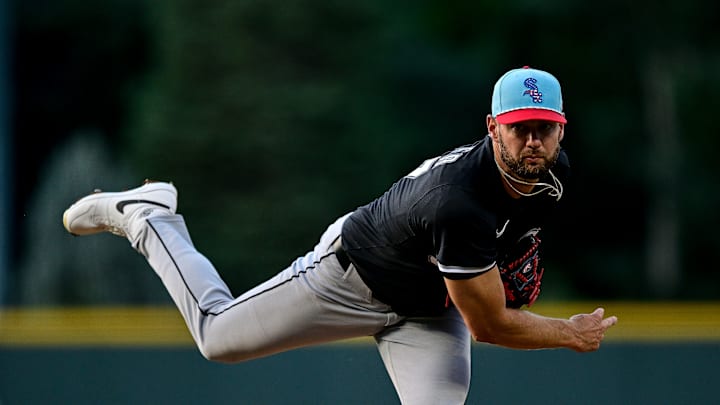Adrian Houser has only made eight starts since joining the Chicago White Sox in mid-May, but he has been special in those outings.
The 32-year-old veteran lowered his season ERA to 1.60 by allowing just two runs, none of which were earned, against the lowly Rockies over the weekend.
Houser's 3.09 FIP indicates he is getting a lot of help from his defense and a bit of good luck, but a FIP number in the threes is still very solid. Houser's 3.50 expected ERA would still be a solid ERA if it was his actual earned run average.
While the sample size is small, Houser has made such a positive impact so quickly that he is already leading the team in fWAR at 1.4.
After last night’s outing, Adrian Houser is now leading the White Sox with 1.4 fWAR in only 8 starts
— Noah Phalen (@Noahp245) July 5, 2025
Houser's stay with the White Sox will likely be a short one. He is only signed through the 2025 season, making him an ideal rental player to trade at the upcoming deadline.
The White Sox will likely want to trade Houser before losing him for nothing in free agency. That's an obvious positive when weighing the pros and cons of moving Houser.
Pro - Adding another solid prospect
Adding another solid prospect to the farm system should be the White Sox goal at the upcoming deadline. They can do so if they move Houser to a contending team that needs starting pitching. I am looking at you, Chicago Cubs.
Houser's fWAR production converted to dollars he could earn in free agency is around $11 million, per FanGraphs. If teams use a similar formula to measure player value in the trade market as much as they do to determine player salaries, then Houser should fetch a 45 to 50 grade prospect.
Those are the prospects that project to be solid, everyday big leaguers, according to the 20-80 grading scale. The White Sox should be in asset accumulation mode. Luis Robert Jr's trade value is plummeting and Chicago needs to take advantage of Houser's peaking trade value to make up for what they are losing with Robert's decline.
Con - Houser's value may be underwhelming
Houser was pitching for the Texas Rangers' Triple-A affiliate this season before joining the White Sox. He was terrible for the New York Mets in 2024 and was only able to get a minor league deal from the Rangers as a free agent.
The last time he was on the market, Houser's value was low. It has just been eight MLB starts since then. GM Chris Getz might find it hard to get the high value he is always asking for. He might have to wait until some higher value pitchers are off the board to possibly get the desired bidding war for Houser.
MLBTradeRumors.com ranked Houser as the 16th best player available on the trade market, crediting him for rebuilding most of his value.
Teams will hammer home the sample size when negotiating with Chris Getz, who will likely ask for a top 10 prospect in return. If Getz wants to play hardball, there is no shame in keeping a pitcher who can still eat innings for a rotation that is filled with young arms approaching career highs.
Con - Loss of intangible value
The White Sox young core still needs to learn how to win. Keeping Houser might have long-term value in preserving the team's young arms, and giving the young hitters a shot to win some games.
It might just be intangible value, but that could prove to be more important than acquiring a mid-tier prospect that just raises the team's floor.
The White Sox need to keep adding prospects, as well. It's all about what Getz and the front office value more.
I think the White Sox should trade Houser if they can get a team's Top 10 prospect. They should keep him if the offers are for anything less.
